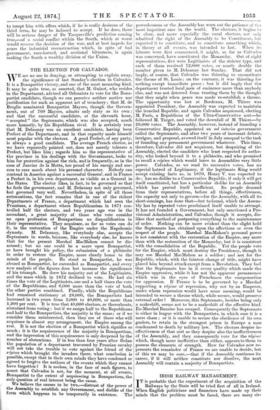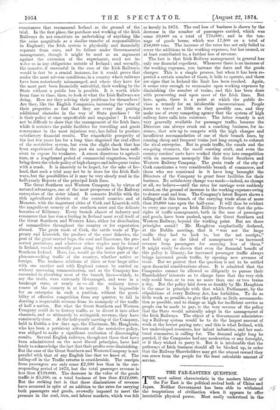IRISH RAILWAY MANAGEMENT.
IT is probable that the experiment of the acquisition of the Railways by the State will be tried first of all in Ireland. When English politicians and financiers have made up their minds that the problem must be faced, there are many cit.-
cumstances that recommend Ireland as the ground of the trial. In the first place, the purchase and working of the Irish Railways do not constitute an undertaking of anything like the same magnitude as a similar transfer of responsibilities in England ; the Irish system is physically and financially separate from ours, and its failure under Governmental management, though it might be used as an argument against the extension of the experiment, need not in- volve us in any obligations outside of Ireland ; and secondly, the transfer, if successful in the case of the Irish Railways, would in fact be a crucial instance, for it would prove that under the most adverse conditions, in a country where railways have been notoriously mismanaged, and where they have for the most part been financially unfruitful, their working by the State without a public loss is possible. It is worth while from time to time, then, to look at what the Irish Railways are doing. How are they solving their problems for themselves? Are they, like the English Companies, increasing the value of their properties so fast that they are every day putting additional obstacles in the way of State purchase ? Or is their policy at once unprofitable and unpopular? It would not be difficult to show that the management of the Irish lines, while it restricts the public facilities for travelling and goods conveyance in the most injurious way, has failed to produce satisfactory financial results. The remarkable prosperity of the last few years has for a long time disguised the real effect of the restrictive system, but even the slight cheek that has been experienced during the past six months has been suffi- cient to expose its weakness. A season disastrous to agricul- ture, or a lengthened period of commercial stagnation, would bring down the whole policy of high charges and infrequent trains with a crash. It is sincerely to be hoped, for the sake of Ire- land, that such a trial may not be in store for the Irish Rail- ways, but the possibilities of it may be very clearly read in the half-yearly Reports of the principal Irish lines.
The Great Southern and Western Company is, by virtue of natural advantages, one of the most prosperous of the Railway enterprises of the sister island. It connects Dublin with the rich agricultural districts of the central counties and of Munster, with the important cities of Cork and Limerick, with the magnificent scenery of the southern coast and the delicate beauties of Killarney. Every branch almost of industry and commerce that has won a footing in Ireland must avail itself of the Great Southern and Western Line, either for distribution of commodities throughout the country or for exportation abroad. The grain trade of Cork, the cattle trade of Tip- perary and Limerick, the produce of the coast fisheries, the peat of the great central bogs, the coal and limestone, the pre- served provisions, and whatever other staples may be found in Ireland, would naturally pass along this main highway of Southern Ireland. Here, too, would go the better part of the pleasure-seeking traffic of the country, whether native or foreign. The business relations of three or four large cities with one another and with England cannot be carried on without unceasing communication, and as the Company has succeeded in absorbing most of the branch lines—which, to say the truth, were extremely ill-managed, and were in a bankrupt state, or nearly so — all the ordinary inter- course of the country is at its mercy. It is impossible for an enterprise in such a position, without the possi- bility of effective competition from any quarter, to fail in drawing a respectable revenue from its monopoly of the traffic of half a nation. But what the Great Southern and Western Company could do to destroy traffic, or to divert it into other channels, and so ultimately to extinguish revenue, they have consistently done. At the half-yearly meeting of the Company, held in Dublin a few days ago, the Chairman, Mr. Haughton, who has been a persistent advocate of the restrictive policy, was obliged to make a significant confession of discouraging results. Several English railways, though not those that have been administered on the most liberal principles, have had lately to acknowledge the fact that their profits were diminishing. But the case of the Great Southern and Western Company is not parallel with that of any English line that we know of. The falling-off in the Traffic returns is considerable. The receipts from passengers are only some £2,300 less than in the cor- responding period of 1873, but the total passenger revenue is less than £139,000. The decrease in the value of the goods traffic is £5,360, on a total business of less than £122,000. But the striking fact is that these diminutions of revenue have occurred in spite of an addition to the rates for carrying both passengers and goods, avowedly imposed to meet the pressure in the coal, iron, and labour markets, which was felt
so keenly in 1873. The real loss of business is shown by the decrease in the number of passengers carried, which was. some 39,000 on a total of 770,000; and in the ton- nage of goods borne, which was 17,500 on a total of 258,000 tons. The increase of the rates has not only failed to cover the additions to the working expenses, but has caused, or at least contributed to, a further loss of revenue.
The fact is that Irish Railway management in general has only one financial expedient. Whenever there is an increase of the working expenses, you increase the fares and the goods charges. This is a simple process, but when it has been re- peated a certain number of times, it fails to operate, and there are signs that in Ireland the limit has been reached. Again, it seems easy enough to economise upon working expenses by diminishing the number of trains, and this has been done with persevering zeal upon most of the Irish lines. But here, again, there is a point at which the public de- vises a remedy for an intolerable inconvenience. People learn to travel as little as they possibly can, and they make use of every competing agency that the system of high railway fares calls into existence. The latter remedy is not very generally available for passenger traffic, because the Directors can always crush out a coaching business, for in- stance, that sets up to compete with the high charges and insufficient acconamodation of one of their branch lines, by running cheap and frequent trains just long enough to exhaust the rival enterprise. But in goods traffic, the canals and the sea-going steamers, the small coasting craft, and even the country carriers' carts have worked their way into competition with an enormous monopoly like the Great Southern and Western Railway Company. The grain trade of the city of Cork constitutes a very considerable branch of commerce, and those who are concerned in it have long besought the Directors of the Company to grant freer facilities for their business. No satisfactory change was made—indeed, no change at all, we believe—until the rates for carriage were suddenly raised, on the ground of increase in the working expenses owing to dearer coal and iron. The Company's latest Report shows a falling-off in this branch of the carrying trade alone of more- than 20,000 tons upon the half-year. It will thus be evident to every one except an Irish Railway Director that the prin- ciples of traffic management, both in the case of passengers and goods, have been pushed, upon the Great Southern and Western Railway, beyond the working point. But are those principles sound? Mr. Haughton emphatically declared, at the Dublin meeting, that it "was not the large traffic they had to look to, but the net receipts," and held up as the ideal of management "an increased revenue from passengers for carrying less of them." It might easily be shown that even the financial benefit of this policy is illusory, for increased passenger traffic always brings increased goods traffic, by opening new avenues of trade. But we protest that the question is not to be settled upon financial considerations alone. It is admitted that the Companies cannot be allowed so diligently to pursue their Shareholders' interests as to charge fares that the very rich only could bear, or to run no more than one or two trains a day. But the policy laid down so frankly by Mr. Haughton is the same in principle with that which Parliament, by the stipulations of every Railway Act, has forbidden. To do as little work as possible, to give the public as little accommoda- tion as possible, and to charge as high for inefficient service as people can be made to pay, is the very reverse of the policy that the State would naturally adopt in the management of the Irish Railways. The object of a Government administer- - ing a Railway system would be to do the largest amount of work at the lowest paying rate ; and this is what Ireland, with her undeveloped resources, her infant industries, and her scat- tered commerce, is calling for. The demand might long be parried, if the Companies had any moderation or any foresight, or if they wished to parry it. But it is intolerable that the pathways of Irish business should all be blocked up, in order that the Railway Shareholders may get the utmost reward they can screw from the people for the least calculable amount of service.































 Previous page
Previous page